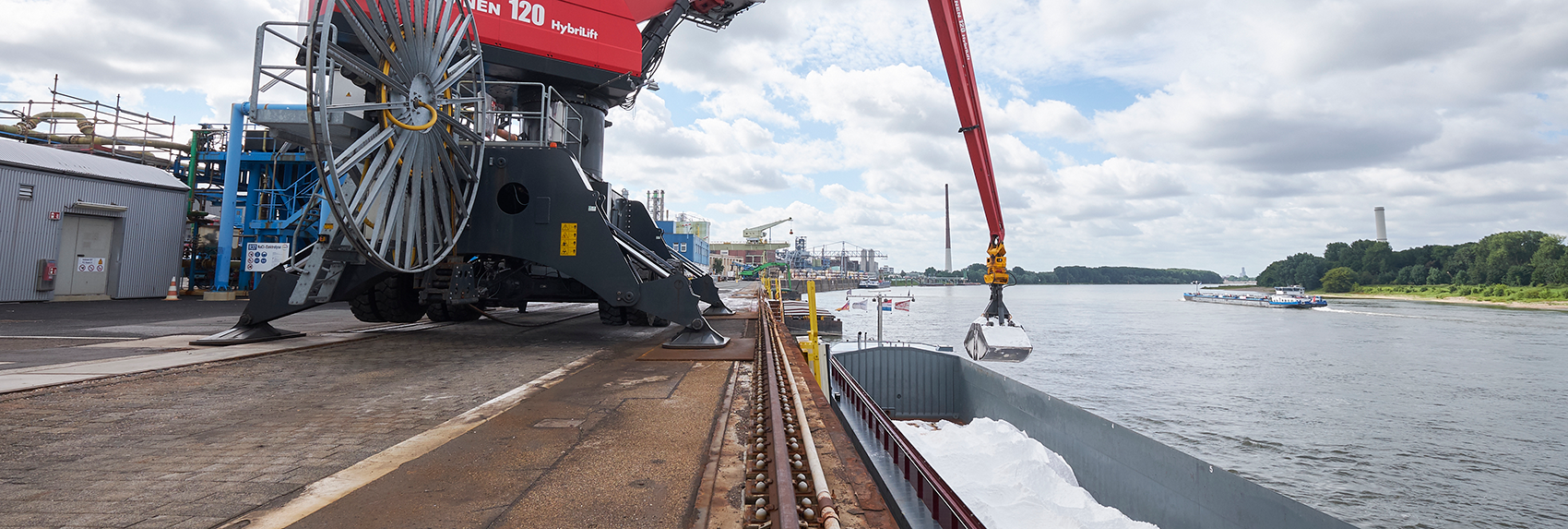Covestro and NPRC plan to use hydrogen-powered barges
In a joint project, Covestro and the logistics service provider Nederlandse Particuliere Rijnvaart- Centrale Cooperative (NPRC) plan to convert the salt transport fleet on the Rhine to hydrogen- powered ships. The project is part of the RH2INE Initiative (Rhine Hydrogen Integration Network of Excellence) of the North Rhine-Westphalia Ministry of Economic Affairs and the Dutch province of South Holland. The aim is to establish a climate-neutral transport route on the Rhine-Alpine corridor, which will contribute to the implementation of the European “Green Deal”. Covestro and NPRC are supporting the development of a hydrogen infrastructure at ports and loading stations along the Rhine to help accomplish this. The first two zero-emission ships are scheduled to operate between the Netherlands and Covestro’s three Lower Rhine sites as early as 2024.
“We want to anchor the principle of Circular Economy within our entire company and produce in a greenhouse gas-neutral way in the long term. This also involves the continuous reduction of indirect emissions, where we want to implement innovative solutions together with strong partners such as NPRC,” explains Dr. Klaus Schäfer, Chief
C have now officially joined as supporters, comes in.
“This collaboration is a wonderful example of the opportunities that arise when all stakeholders in the supply chain are committed to sustainability. The reliable partnership with Covestro provides our cooperative of independent inland shipping entrepreneurs with a solid basis to take on the significant investment that the switch to zero-emission transport requires. This form of shared responsibility for the supply chain is the future for innovation in logistics,” says Femke Brenninkmeijer, CEO NPRC.
Salt is the most important raw material in terms of transport volume for Covestro sites in North Rhine-Westphalia. As part of RH2INE, Covestro and NPRC gradually want to make the transport of this raw material emission free. To this end, the partners initially plan to put two hydrogen-powered barges into operation from 2024, with more ships to follow. The initial focus will be on the technical and economic feasability of the project. As part of this process, the technical design of the hull will also be optimized so that the ships can be used during low water. The feasibility of using green hydrogen from Covestro’s own chlorine electrolysis to refuel the inland waterway vessels is also being investigated.
With their joint project, Covestro and NPRC are making a significant contribution to RH2INE’s interim goal: By 2024, the cross-border initiative intends to put several hydrogen-powered ships into operation between Rotterdam and Cologne together with other partners from the consortium. The long-term goal is to create a climate-neutral “Rhine-Alpine” transport corridor. In addition to the NRW Ministry of Economics and the Dutch provinces of South Holland and Gelderland, supporters include the ports of Duisburg, Neuss/Düsseldorf, Cologne and Rotterdam, along with other logistics and industrial companies.
For Covestro, the switch to hydrogen power is a further step on the road to climate-neutral production. The company intends to fully align all its operations with a Circular Economy. Renewable energy and green hydrogen are two important building blocks in this framework.
Want to know more?
I like to hear from you.

Margriet Geluk
Logistics Intelligence & Innovation Manager
